Unit 1 Where did you go on vacation-Section A (Grammar Focus-3c)课件31张2021-2022学年人教版(新目标)英语八年级上册
文档属性
| 名称 | Unit 1 Where did you go on vacation-Section A (Grammar Focus-3c)课件31张2021-2022学年人教版(新目标)英语八年级上册 |
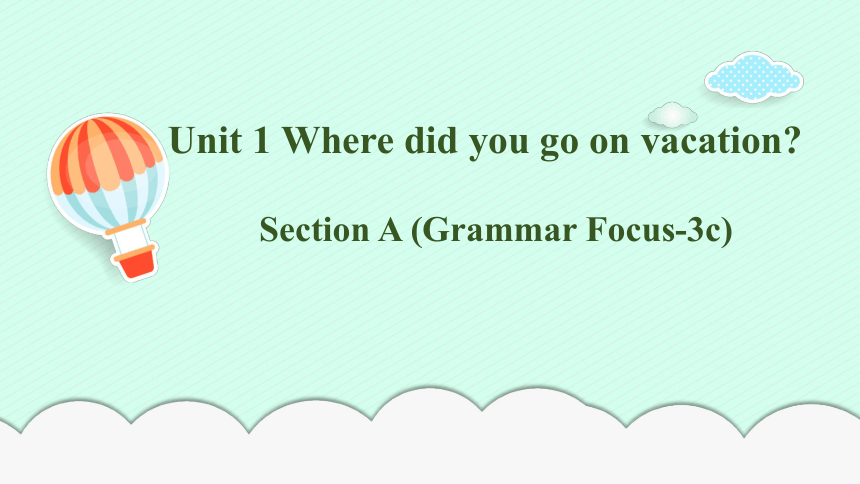
|
|
| 格式 | pptx | ||
| 文件大小 | 3.1MB | ||
| 资源类型 | 教案 | ||
| 版本资源 | 人教新目标(Go for it)版 | ||
| 科目 | 英语 | ||
| 更新时间 | 2021-08-21 00:00:00 | ||
图片预览


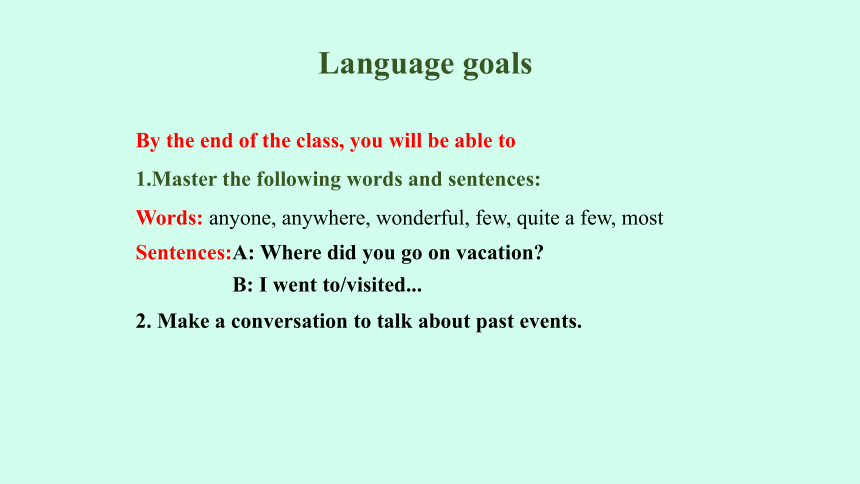
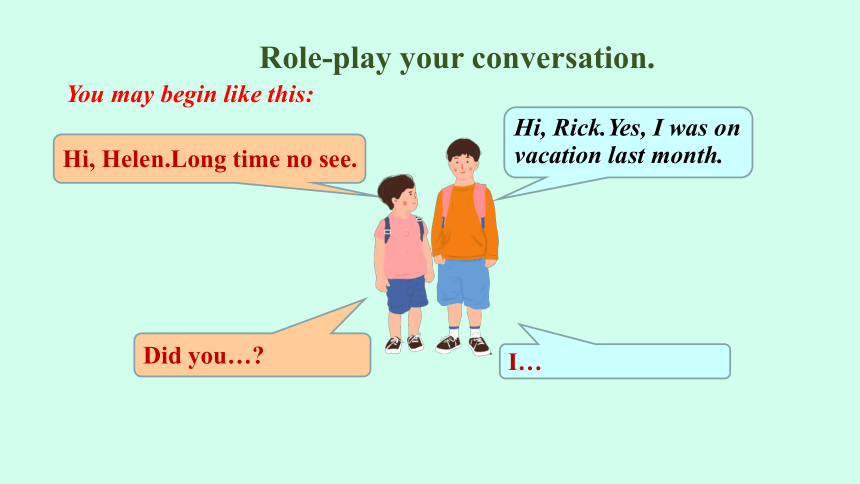
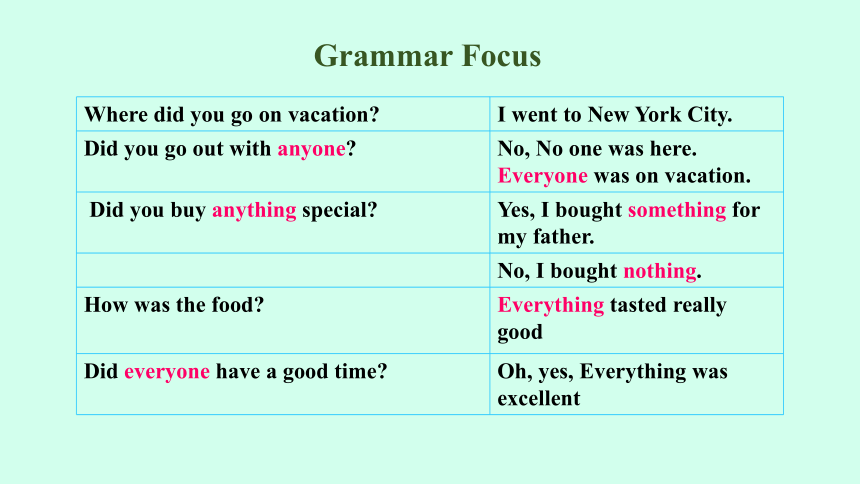
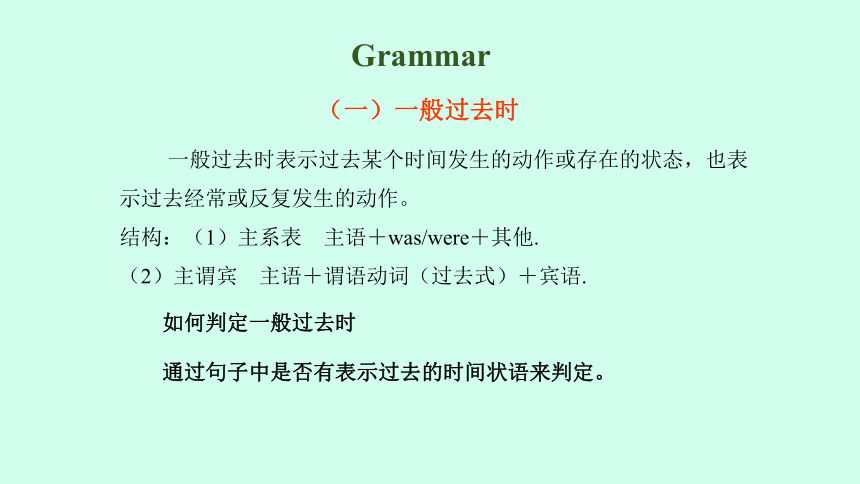
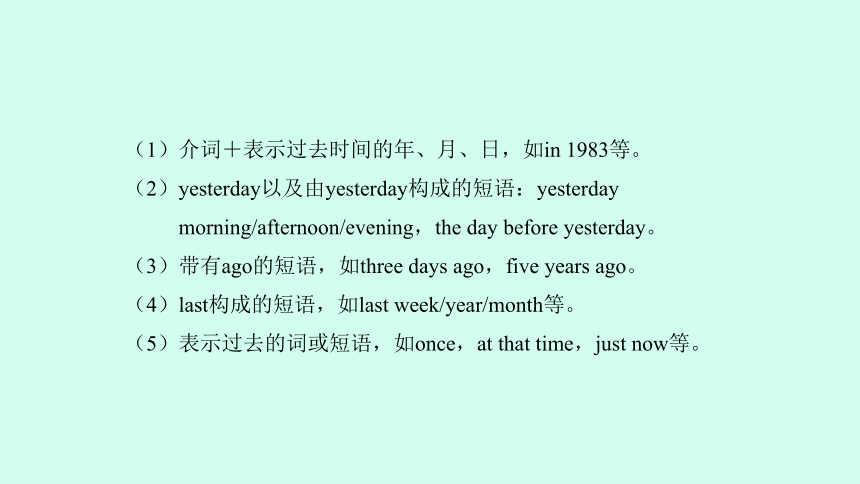
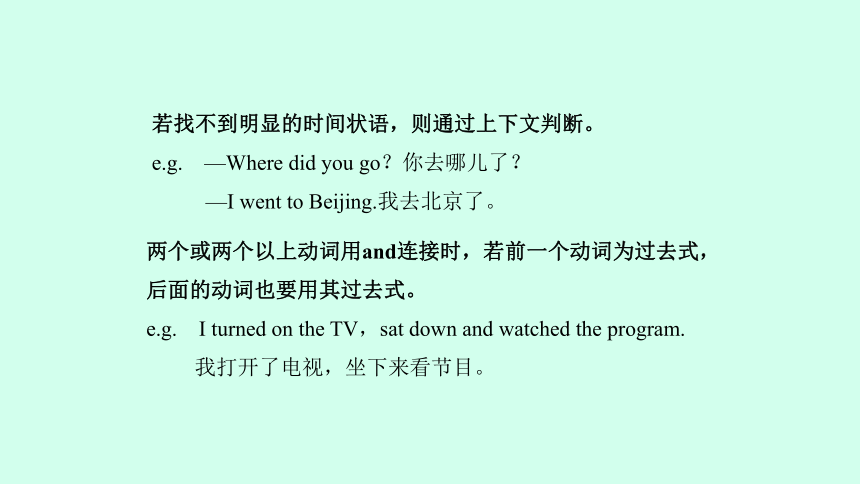
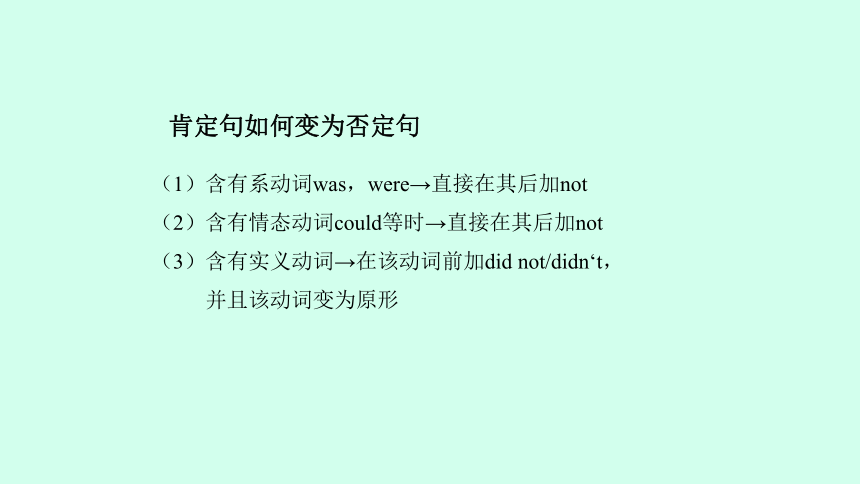
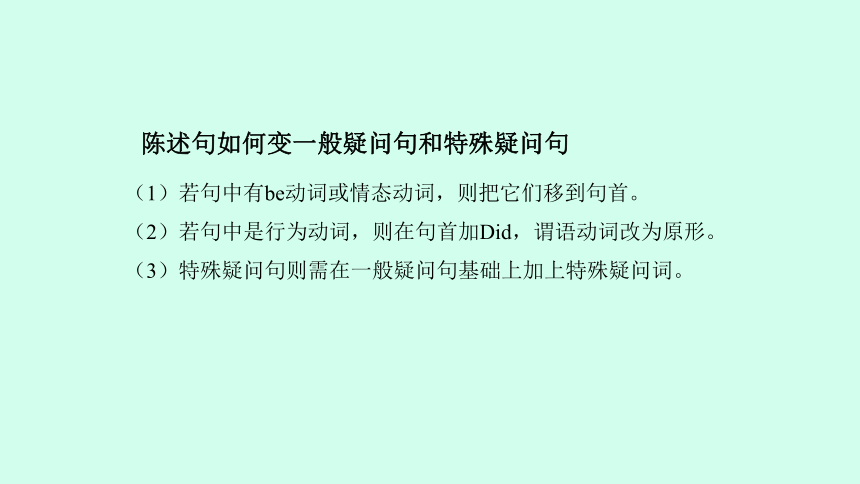
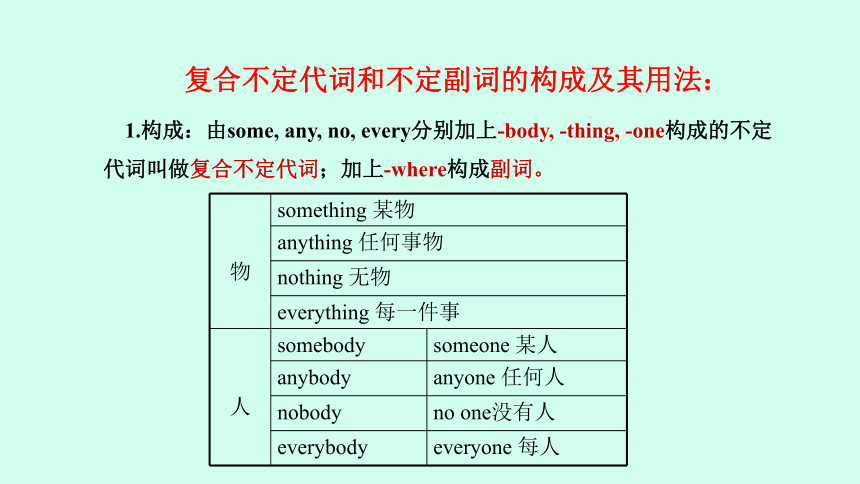
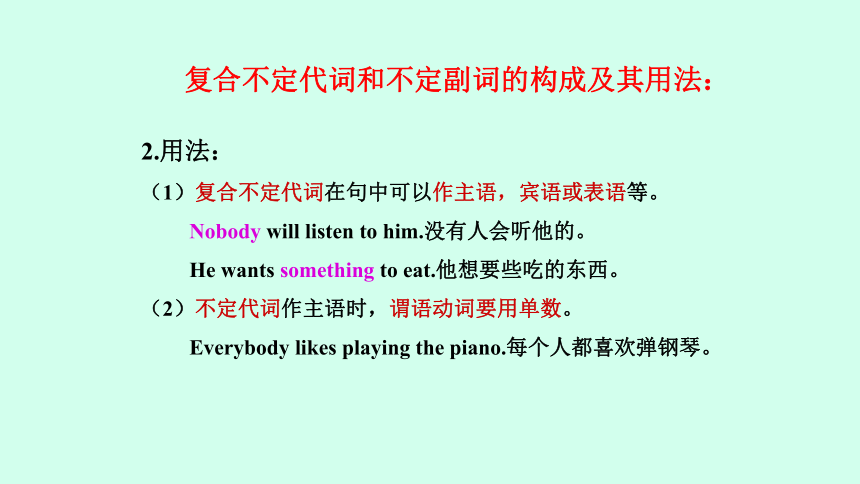
文档简介
(共31张PPT)
Unit
1
Where
did
you
go
on
vacation?
Section
A
(Grammar
Focus-3c)
Free
talk
Where
did
you
go
on
vacation?
Did
you
often
go
out
for
a
vacation?
Did
you
enjoy
your
vacation
?
Language
goals
By
the
end
of
the
class,
you
will
be
able
to
1.Master
the
following
words
and
sentences:
Words:
anyone,
anywhere,
wonderful,
few,
quite
a
few,
most
Sentences:A:
Where
did
you
go
on
vacation?
B:
I
went
to/visited...
2.
Make
a
conversation
to
talk
about
past
events.
Role-play
your
conversation.
Hi,
Helen.Long
time
no
see.
Hi,
Rick.Yes,
I
was
on
vacation
last
month.
Did
you…?
I…
You
may
begin
like
this:
Grammar
Focus
Where
did
you
go
on
vacation?
I
went
to
New
York
City.
Did
you
go
out
with
anyone?
No,
No
one
was
here.
Everyone
was
on
vacation.
Did
you
buy
anything
special?
Yes,
I
bought
something
for
my
father.
No,
I
bought
nothing.
How
was
the
food?
Everything
tasted
really
good
Did
everyone
have
a
good
time?
Oh,
yes,
Everything
was
excellent
(一)一般过去时
如何判定一般过去时
一般过去时表示过去某个时间发生的动作或存在的状态,也表示过去经常或反复发生的动作。
结构:(1)主系表 主语+was/were+其他.
(2)主谓宾 主语+谓语动词(过去式)+宾语.
通过句子中是否有表示过去的时间状语来判定。
Grammar
(1)介词+表示过去时间的年、月、日,如in
1983等。
(2)yesterday以及由yesterday构成的短语:yesterday
morning/afternoon/evening,the
day
before
yesterday。
(3)带有ago的短语,如three
days
ago,five
years
ago。
(4)last构成的短语,如last
week/year/month等。
(5)表示过去的词或短语,如once,at
that
time,just
now等。
若找不到明显的时间状语,则通过上下文判断。
e.g.
—Where
did
you
go?你去哪儿了?
—I
went
to
Beijing.我去北京了。
两个或两个以上动词用and连接时,若前一个动词为过去式,后面的动词也要用其过去式。
e.g.
I
turned
on
the
TV,sat
down
and
watched
the
program.
我打开了电视,坐下来看节目。
肯定句如何变为否定句
(1)含有系动词was,were→直接在其后加not
(2)含有情态动词could等时→直接在其后加not
(3)含有实义动词→在该动词前加did
not/didn‘t,
并且该动词变为原形
陈述句如何变一般疑问句和特殊疑问句
(1)若句中有be动词或情态动词,则把它们移到句首。
(2)若句中是行为动词,则在句首加Did,谓语动词改为原形。
(3)特殊疑问句则需在一般疑问句基础上加上特殊疑问词。
1.构成:由some,
any,
no,
every分别加上-body,
-thing,
-one构成的不定代词叫做复合不定代词;加上-where构成副词。
复合不定代词和不定副词的构成及其用法:
物
something
某物
anything
任何事物
nothing
无物
everything
每一件事
人
somebody
someone
某人
anybody
anyone
任何人
nobody
no
one没有人
everybody
everyone
每人
2.用法:
(1)复合不定代词在句中可以作主语,宾语或表语等。
Nobody
will
listen
to
him.没有人会听他的。
He
wants
something
to
eat.他想要些吃的东西。
(2)不定代词作主语时,谓语动词要用单数。
Everybody
likes
playing
the
piano.每个人都喜欢弹钢琴。
复合不定代词和不定副词的构成及其用法:
(3)复合不定代词与形容词或动词不定式连用
形容词修饰复合不定代词时,形容词后置。
—Is
there
in
today's
newspaper?
—Yes,
quite
a
lot.
A.
anything
interesting
B.
something
interesting
C.
interesting
anything
D.
interesting
something
A
巧学不定代词:
不定代词美名扬,修饰成分后边藏;
单数动词作谓语,何时何地都一样。
复合不定代词与动词不定式连用,
不定式作后置定语。
3a
Fill
in
the
blanks
with
the
words
in
the
box
and
practice
the
conversation.
anyone
something
anything
everything
nothing
Linda:
Did
you
do
fun
on
your
vacation,
Alice?
Alice:
Yes,
I
did.
I
went
to
Sanya.
Linda:
How
did
you
like
it?
Alice:
Well,
it
was
my
first
time
there,
so
was
really
interesting.
Linda:
Did
you
go
with
?
Alice:
Yes,
I
did.
I
went
with
my
sister.
Linda:
Did
you
go
shopping?
Alice:
Of
course!
I
bought
for
my
parents,
but
for
myself.
Linda:
Why
didn’t
you
buy
for
yourself?
Alice:
I
didn’t
really
see
I
liked.
anything
everything
anyone
something
anything
anything
nothing
1.
How
do
you
like
...?是口语中的一个常用句式,用来询问对方的要求或征求对方的意见、看法或判断,意为“你觉得······怎么样?相当于“What
do
you
think
of...?”。
—How
do
you
like
this
party?你觉得这个晚会怎么样?
—Wonderful.很棒。
Language
points
2.
myself是反身代词,意为“我自己;我本人”。反身代词是用来强调或表示动作返回到动作执行本身的代词。
I
bought
myself
an
apple.我给我自己买了一个苹果。
反身代词的常见用法
(1)反身代词作宾语,表示主语和宾语为同一个人或事物。
e.g.
He
bought
himself
a
book.他给自己买了一本书。
(2)反身代词作同位语,起强调作用。
e.g.
I
myself
repaired
the
bike.
我自己修的自行车。
Language
points
含反身代词的常用词组:
teach
oneself
自学
learn...by
oneself
自学……
enjoy
oneself
玩得高兴,过得愉快
help
oneself
to...
为(自己)取用……
by
oneself
独自
反身代词小结:
人称
单数
复数
第一人称
myself
ourselves
第二人称
yourself
yourselves
第三人称
herself/himself/itself
themselves
数
3b
Fill
in
the
blanks
in
the
e-mail
message
with
the
words
in
the
box.
anything,
everything,
nothing
,everyone
,
no
one
Dear
Bill,
How
was
your
vacation?
Did
you
do
_________
interesting?
Did
__________
in
the
family
go
with
you?
I
went
to
a
friend’s
farm
in
the
countryside
with
my
family.__________
was
great.
We
fed
some
hens
and
saw
some
baby
pigs.
They
were
so
cute!
The
only
problem
was
that
there
was
__________
much
to
do
in
the
evening
but
read.
Still
___________
seemed
to
be
bored.
Bye
for
now.
Mark
anything
everyone
everything
nothing
No
one
1.
feed作动词,意为“喂养;饲养”,
其过去式和过去分词都是fed。
She
fed
him
a
cookie.她给了他一块饼干。
【拓展】与feed有关的短语
feed
sb./sth.喂养某人或某种动物
feed...to...把······喂给····
feed...on
/with...用······来喂(养)······
feed
on...以······为食
Language
points
We
f
our
dogs
fresh
meat.
eed
I
feed
the
grapes
my
daughter.
A.
to B.
on C.
with D.
in
A
on
Language
points
2.
Still
on
one
seemed
to
be
bored.
然而似乎没有人感到厌烦。
(1)still
作为连词时,意为“尽管如此,可还是要;然而;不过”;still
作副词使用,意为“仍旧;还”,表示某事仍在继续,多用于肯定句或疑问句中。
Although
we
are
very
tired,
still
we
shall
work.
虽然我们很累,但我们还将工作。
My
mother
is
still
cooking.
我妈妈还在做饭。
Language
points
(2)no
one
意为“没有人”,通常指人,不指物,不能与of连用,谓语动词通常用单数。
No
one
likes
her.
没人喜欢她。
No
one
knows
how
to
do
the
work.
没有人知道怎样做那项工作。
Language
points
(3)seem作动词,
意为“似乎;好像”,“主语+
seem
+to
be
+表语”,
表语多为名词或形容词,有时是其他的词或短语,以说明主语的特征或状态。
The
man
over
there
seems
to
be
a
new
teacher.
那边的那个人看上去像一个新老师。
Mr.
Black
seemed
to
be
quite
happy.
布莱克先生好像十分快乐。
【拓展】It
seems
+
that从句
It
seems
to
me
that
Mr.
Brown
will
not
come
again.
在我看来布朗先生不会再来了。
Language
points
3c
Ask
your
group
questions
about
their
last
vacation.
Then
tell
the
class
your
results.
Did
you…
Everyone
Someone
(write
the
classmate's
name)
No
one
eat
anything
at
a
restaurant?
read
anything
interesting?
visit
anyone
in
your
family?
buy
anything?
keep
a
diary?
In
our
group,
everyone
ate
something
at
a
restaurant.
No
one
reads
anything
interesting.
Li
Lei
visits
his
grandparents
in
the
town.
Everyone
buys
something
interesting.
Xiang
Hua
keeps
a
diary.
Now
work
by
yourselves.
Then
give
your
group's
results.
Example
一、选词(组)填空
1.Is
there
________
new
in
today's
newspaper?
2.___________
is
ready;let's
go
swimming.
3.Can
________
guess
what
this
is?
4.—I
can't
hear
clearly.
—There
may
be
___________
wrong
with
your
ears.
5.—Who
teaches
you
English?
—_________.I
learn
it
by
myself.
anything
something,
anyone,
no
one,
anything,
everything
Everything
anyone
something
No
one
Exercises
二、请根据汉语,补全英语句子。
1.我为妈妈的生日买了特别的东西。
I
bought
___________________
for
my
mother's
birthday.
2.这种蛋糕尝起来的确很可口。
This
kind
of
cake
_______________.
3.机器人所做的工作似乎很令人厌倦。
The
work
that
robots
do
________be
boring.
4.他们需要找个地方过夜吗?
Do
they
need
___________
stay
for
the
night?
5.记日记是一个好习惯。
It
is
a
good
habit
_____________.
something
special
tastes
really
good
seems
to
anywhere
to
to
keep
a
diary
Exercises
三、根据句意及汉语提示完成句子。
1.
There
are
___________(相当多)
books
on
her
bookcase.
2.
_________(当然)
there
are
lots
of
interesting
animals
in
the
zoo.
3.
Every
year
he
and
his
friends
_________________(去夏令营).
4.
—Where
did
you
go
on
vacation?
—__________________(去了海滩).
5.
Yesterday
I
____________
(待在家里)
and
watched
TV.
quite
a
few
Of
course
go
to
summer
camp
I
went
to
the
beach
stayed
at
home
Exercises
Bye-bye!
Unit
1
Where
did
you
go
on
vacation?
Section
A
(Grammar
Focus-3c)
Free
talk
Where
did
you
go
on
vacation?
Did
you
often
go
out
for
a
vacation?
Did
you
enjoy
your
vacation
?
Language
goals
By
the
end
of
the
class,
you
will
be
able
to
1.Master
the
following
words
and
sentences:
Words:
anyone,
anywhere,
wonderful,
few,
quite
a
few,
most
Sentences:A:
Where
did
you
go
on
vacation?
B:
I
went
to/visited...
2.
Make
a
conversation
to
talk
about
past
events.
Role-play
your
conversation.
Hi,
Helen.Long
time
no
see.
Hi,
Rick.Yes,
I
was
on
vacation
last
month.
Did
you…?
I…
You
may
begin
like
this:
Grammar
Focus
Where
did
you
go
on
vacation?
I
went
to
New
York
City.
Did
you
go
out
with
anyone?
No,
No
one
was
here.
Everyone
was
on
vacation.
Did
you
buy
anything
special?
Yes,
I
bought
something
for
my
father.
No,
I
bought
nothing.
How
was
the
food?
Everything
tasted
really
good
Did
everyone
have
a
good
time?
Oh,
yes,
Everything
was
excellent
(一)一般过去时
如何判定一般过去时
一般过去时表示过去某个时间发生的动作或存在的状态,也表示过去经常或反复发生的动作。
结构:(1)主系表 主语+was/were+其他.
(2)主谓宾 主语+谓语动词(过去式)+宾语.
通过句子中是否有表示过去的时间状语来判定。
Grammar
(1)介词+表示过去时间的年、月、日,如in
1983等。
(2)yesterday以及由yesterday构成的短语:yesterday
morning/afternoon/evening,the
day
before
yesterday。
(3)带有ago的短语,如three
days
ago,five
years
ago。
(4)last构成的短语,如last
week/year/month等。
(5)表示过去的词或短语,如once,at
that
time,just
now等。
若找不到明显的时间状语,则通过上下文判断。
e.g.
—Where
did
you
go?你去哪儿了?
—I
went
to
Beijing.我去北京了。
两个或两个以上动词用and连接时,若前一个动词为过去式,后面的动词也要用其过去式。
e.g.
I
turned
on
the
TV,sat
down
and
watched
the
program.
我打开了电视,坐下来看节目。
肯定句如何变为否定句
(1)含有系动词was,were→直接在其后加not
(2)含有情态动词could等时→直接在其后加not
(3)含有实义动词→在该动词前加did
not/didn‘t,
并且该动词变为原形
陈述句如何变一般疑问句和特殊疑问句
(1)若句中有be动词或情态动词,则把它们移到句首。
(2)若句中是行为动词,则在句首加Did,谓语动词改为原形。
(3)特殊疑问句则需在一般疑问句基础上加上特殊疑问词。
1.构成:由some,
any,
no,
every分别加上-body,
-thing,
-one构成的不定代词叫做复合不定代词;加上-where构成副词。
复合不定代词和不定副词的构成及其用法:
物
something
某物
anything
任何事物
nothing
无物
everything
每一件事
人
somebody
someone
某人
anybody
anyone
任何人
nobody
no
one没有人
everybody
everyone
每人
2.用法:
(1)复合不定代词在句中可以作主语,宾语或表语等。
Nobody
will
listen
to
him.没有人会听他的。
He
wants
something
to
eat.他想要些吃的东西。
(2)不定代词作主语时,谓语动词要用单数。
Everybody
likes
playing
the
piano.每个人都喜欢弹钢琴。
复合不定代词和不定副词的构成及其用法:
(3)复合不定代词与形容词或动词不定式连用
形容词修饰复合不定代词时,形容词后置。
—Is
there
in
today's
newspaper?
—Yes,
quite
a
lot.
A.
anything
interesting
B.
something
interesting
C.
interesting
anything
D.
interesting
something
A
巧学不定代词:
不定代词美名扬,修饰成分后边藏;
单数动词作谓语,何时何地都一样。
复合不定代词与动词不定式连用,
不定式作后置定语。
3a
Fill
in
the
blanks
with
the
words
in
the
box
and
practice
the
conversation.
anyone
something
anything
everything
nothing
Linda:
Did
you
do
fun
on
your
vacation,
Alice?
Alice:
Yes,
I
did.
I
went
to
Sanya.
Linda:
How
did
you
like
it?
Alice:
Well,
it
was
my
first
time
there,
so
was
really
interesting.
Linda:
Did
you
go
with
?
Alice:
Yes,
I
did.
I
went
with
my
sister.
Linda:
Did
you
go
shopping?
Alice:
Of
course!
I
bought
for
my
parents,
but
for
myself.
Linda:
Why
didn’t
you
buy
for
yourself?
Alice:
I
didn’t
really
see
I
liked.
anything
everything
anyone
something
anything
anything
nothing
1.
How
do
you
like
...?是口语中的一个常用句式,用来询问对方的要求或征求对方的意见、看法或判断,意为“你觉得······怎么样?相当于“What
do
you
think
of...?”。
—How
do
you
like
this
party?你觉得这个晚会怎么样?
—Wonderful.很棒。
Language
points
2.
myself是反身代词,意为“我自己;我本人”。反身代词是用来强调或表示动作返回到动作执行本身的代词。
I
bought
myself
an
apple.我给我自己买了一个苹果。
反身代词的常见用法
(1)反身代词作宾语,表示主语和宾语为同一个人或事物。
e.g.
He
bought
himself
a
book.他给自己买了一本书。
(2)反身代词作同位语,起强调作用。
e.g.
I
myself
repaired
the
bike.
我自己修的自行车。
Language
points
含反身代词的常用词组:
teach
oneself
自学
learn...by
oneself
自学……
enjoy
oneself
玩得高兴,过得愉快
help
oneself
to...
为(自己)取用……
by
oneself
独自
反身代词小结:
人称
单数
复数
第一人称
myself
ourselves
第二人称
yourself
yourselves
第三人称
herself/himself/itself
themselves
数
3b
Fill
in
the
blanks
in
the
message
with
the
words
in
the
box.
anything,
everything,
nothing
,everyone
,
no
one
Dear
Bill,
How
was
your
vacation?
Did
you
do
_________
interesting?
Did
__________
in
the
family
go
with
you?
I
went
to
a
friend’s
farm
in
the
countryside
with
my
family.__________
was
great.
We
fed
some
hens
and
saw
some
baby
pigs.
They
were
so
cute!
The
only
problem
was
that
there
was
__________
much
to
do
in
the
evening
but
read.
Still
___________
seemed
to
be
bored.
Bye
for
now.
Mark
anything
everyone
everything
nothing
No
one
1.
feed作动词,意为“喂养;饲养”,
其过去式和过去分词都是fed。
She
fed
him
a
cookie.她给了他一块饼干。
【拓展】与feed有关的短语
feed
sb./sth.喂养某人或某种动物
feed...to...把······喂给····
feed...on
/with...用······来喂(养)······
feed
on...以······为食
Language
points
We
f
our
dogs
fresh
meat.
eed
I
feed
the
grapes
my
daughter.
A.
to B.
on C.
with D.
in
A
on
Language
points
2.
Still
on
one
seemed
to
be
bored.
然而似乎没有人感到厌烦。
(1)still
作为连词时,意为“尽管如此,可还是要;然而;不过”;still
作副词使用,意为“仍旧;还”,表示某事仍在继续,多用于肯定句或疑问句中。
Although
we
are
very
tired,
still
we
shall
work.
虽然我们很累,但我们还将工作。
My
mother
is
still
cooking.
我妈妈还在做饭。
Language
points
(2)no
one
意为“没有人”,通常指人,不指物,不能与of连用,谓语动词通常用单数。
No
one
likes
her.
没人喜欢她。
No
one
knows
how
to
do
the
work.
没有人知道怎样做那项工作。
Language
points
(3)seem作动词,
意为“似乎;好像”,“主语+
seem
+to
be
+表语”,
表语多为名词或形容词,有时是其他的词或短语,以说明主语的特征或状态。
The
man
over
there
seems
to
be
a
new
teacher.
那边的那个人看上去像一个新老师。
Mr.
Black
seemed
to
be
quite
happy.
布莱克先生好像十分快乐。
【拓展】It
seems
+
that从句
It
seems
to
me
that
Mr.
Brown
will
not
come
again.
在我看来布朗先生不会再来了。
Language
points
3c
Ask
your
group
questions
about
their
last
vacation.
Then
tell
the
class
your
results.
Did
you…
Everyone
Someone
(write
the
classmate's
name)
No
one
eat
anything
at
a
restaurant?
read
anything
interesting?
visit
anyone
in
your
family?
buy
anything?
keep
a
diary?
In
our
group,
everyone
ate
something
at
a
restaurant.
No
one
reads
anything
interesting.
Li
Lei
visits
his
grandparents
in
the
town.
Everyone
buys
something
interesting.
Xiang
Hua
keeps
a
diary.
Now
work
by
yourselves.
Then
give
your
group's
results.
Example
一、选词(组)填空
1.Is
there
________
new
in
today's
newspaper?
2.___________
is
ready;let's
go
swimming.
3.Can
________
guess
what
this
is?
4.—I
can't
hear
clearly.
—There
may
be
___________
wrong
with
your
ears.
5.—Who
teaches
you
English?
—_________.I
learn
it
by
myself.
anything
something,
anyone,
no
one,
anything,
everything
Everything
anyone
something
No
one
Exercises
二、请根据汉语,补全英语句子。
1.我为妈妈的生日买了特别的东西。
I
bought
___________________
for
my
mother's
birthday.
2.这种蛋糕尝起来的确很可口。
This
kind
of
cake
_______________.
3.机器人所做的工作似乎很令人厌倦。
The
work
that
robots
do
________be
boring.
4.他们需要找个地方过夜吗?
Do
they
need
___________
stay
for
the
night?
5.记日记是一个好习惯。
It
is
a
good
habit
_____________.
something
special
tastes
really
good
seems
to
anywhere
to
to
keep
a
diary
Exercises
三、根据句意及汉语提示完成句子。
1.
There
are
___________(相当多)
books
on
her
bookcase.
2.
_________(当然)
there
are
lots
of
interesting
animals
in
the
zoo.
3.
Every
year
he
and
his
friends
_________________(去夏令营).
4.
—Where
did
you
go
on
vacation?
—__________________(去了海滩).
5.
Yesterday
I
____________
(待在家里)
and
watched
TV.
quite
a
few
Of
course
go
to
summer
camp
I
went
to
the
beach
stayed
at
home
Exercises
Bye-bye!
同课章节目录
- Unit 1 Where did you go on vacation?
- Section A
- Section B
- Unit 2 How often do you exercise?
- Section A
- Section B
- Unit 3 I'm more outgoing than my sister.
- Section A
- Section B
- Unit 4 What's the best movie theater?
- Section A
- Section B
- Unit 5 Do you want to watch a game show?
- Section A
- Section B
- Unit 6 I'm going to study computer science.
- Section A
- Section B
- Unit 7 Will people have robots?
- Section A
- Section B
- Unit 8 How do you make a banana milk shake?
- Section A
- Section B
- Unit 9 Can you come to my party?
- Section A
- Section B
- Unit 10 If you go to the party, you'll have a grea
- Section A
- Section B
